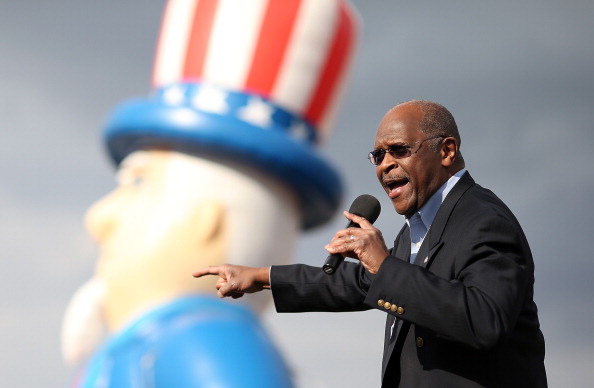(Bloomberg Opinion) -- President Donald Trump says he intends to nominate Herman Cain, a business executive and former Republican presidential candidate, and Stephen Moore, an economics commentator and activist who focuses on tax policy, for seats on the Federal Reserve Board of Governors. The Senate should not confirm them, even if some of the commentary opposing them has been off the mark.
Critics point out that neither man holds a doctorate in economics. But while it is important that the Fed committee that sets monetary policy has a sufficient number of Ph.D economists, not every Fed governor or regional Fed bank president needs to be an economist with a record of peer-reviewed publications. (Fed Chair Jerome Powell himself does not have a doctorate in economics.)
Another objection to Cain and Moore is that they have unorthodox views on monetary policy. They both seem to believe that the Fed should aim to keep the dollar stable against gold, or a broader basket of commodities, rather than attempting to keep overall consumer prices growing at a stable rate and the economy at full employment.
Returning to a modified gold standard could lead to disastrous results for the U.S. and global economies. It has been long discarded because it creates too much economic instability. And it can dictate the wrong course for monetary policy in emergencies.
As the Great Recession was beginning in 2008, commodity prices were increasing and the dollar was falling. A modified gold standard prescribes rate increases in this situation, when rate cuts were what the economy needed. No member of the Fed board should be this wrong about monetary policy and macroeconomics.
Even so, it is easy to overstate the potential damage from having one or two governors with the wrong view of how the economy works.
So why am I so strongly opposed to these nominees?
First, one of them could become the Fed chair. Someone with a track record of supporting a modified gold standard could be a Fed governor without major disruption. But as Fed chair, all bets are off.
Neither man has shown an ability to inspire confidence and restraint through their rhetoric. It is easy to imagine markets being confused by their public statements, introducing volatility and uncertainty into business decisions. For example, Moore in the past has seemed confused about whether deflation in commodities prices is enough to characterize overall prices as falling. And he has publicly stoked anxiety about “hyperinflation” without solid reason.
In a recession or financial crisis, the Fed chair must inspire the confidence of markets and elected leaders, and craft policy (not just interest-rate policy) to help bring the crisis to an end. There are many candidates with significantly more relevant experience in economics and markets who would better serve as chair during a crisis.
Though Powell isn’t going anywhere right now, the president could try to force him out. And if Trump wins a second term, he will be in a position to appoint a new chair through the normal process.
If the Senate confirms Moore or Cain as Fed governors, does anyone believe they wouldn’t sail through if nominated as Fed chair? The Senate should treat these potential nominations as if it is confirming a Fed chair, not a Fed governor.
Moore has said that he would not be a “sycophant for Trump” if nominated and confirmed, and he claims to have shown independence from the president on tariffs and antitrust enforcement.
But what matters as much as whether Cain or Moore would simply do the president’s bidding at the Fed is whether market participants think they would. Price inflation today is determined in large part by what people and businesses think inflation will be in the future. The Fed has been successful at removing political considerations from expectations about future inflation.
For example, consumers, businesses and investors today do not expect that the Fed will run the economy hot with the goal of helping Trump. If they did expect the Fed would boost the economy to help the president, then they would expect inflation to accelerate, and they would raise prices today in response.
Public confidence in the political independence of the Fed, then, is crucial to monetary policy’s ability to actually keep prices stable. And stable prices are necessary for a well-functioning economy.
From the public reaction to Moore’s and Cain’s potential nomination, it seems that many leaders in the financial industry, investors, prominent commentators as well as political officials are worried about whether Moore and Cain are sufficiently independent of partisan politics. This reaction should give senators serious pause.
The bigger concern is not about Moore and Cain. It is whether they will be the start of a trend away from Fed governors who inspire the confidence necessary to maintain the perception and reality of political independence. If a Democrat wins the White House in 2020, will he or she nominate the political left’s equivalent of Moore and Cain? The Senate should not consent to a potential first step down this slippery slope.
To the extent that the president is considering these nominees to push the Fed toward keeping interest rates low for longer, my final concern is that this move will backfire.
If Moore and Cain on the Fed agitated for rate cuts, Powell, as chairman, will rightly be concerned about perceptions of Fed independence — more so than he would be if other governors were arguing for the same policy stance. In order to demonstrate independence, Powell might be marginally more likely to tighten rates.
This scenario is exactly what needs to be guarded against.
